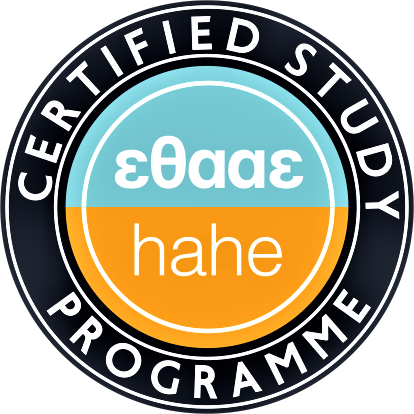Curriculum
The curriculum was developed taking into account similar curricula of Greek and foreign universities, as well as the curricula advocated by pertinent scientific bodies, such as the Association for Computing Machinery (ACM), the British Computer Society, and the Institute for Electrical and Electronic Engineers (IEEE). Besides a thorough education in Informatics, the curriculum of the Department also aims at familiarizing students with Informatics applications to other sciences and fields.
The student must initially complete 22 compulsory courses covering an extensive, but necessary, background common to all students:
- Core of Informatics (15 lessons)
- Mathematics (5 lessons)
- Economics and Administrative Sciences (2 courses)
Then, the student deepens his knowledge in the scientific areas he wants by attending at least 10 additional courses. Such courses are organized in modules, with each module consisting of 3 compulsory courses that provide the basic knowledge of the module as well as some selective courses from the same module that allow further deepening of the individual module specializations. The modules are as follows:
- Theoretical Computer Science
- Computer Systems and Networks
- Information Systems and Information Security
- Databases and Knowledge Management
- Operations Research and Economics of Information Technology
- Applied Mathematics and Scientific Computing
To qualify for a degree, the student may receive either additional module courses or elective courses from other departments of AUEB.
Therefore, upon graduating, students of the Department will be able to:
- Apply suitable, scientifically sound algorithmic, mathematical, and scientific processes and methods in order to solve problems arising in Informatics
- Analyze and compare alternative ways of handling scientific or technical problems.
- Solve problems requiring specialized technical knowledge in at least two of the following areas:
- Theoretical Computer Science
- Computer Systems and Networks
- Information Systems and Information Security
- Databases and Knowledge Management
- Operations Research and Economics of Information Technology
- Computational Mathematics και Scientific Calculations
- Function effectively as members of teams working towards the analysis, design and implementation of IT projects.
- Understand the broader applications of Computer Science in other disciplines studied in the Athens University of Economics and Business (Administration, Economics, Accounting, Statistics, Marketing and Communication, etc.).
- Understand the social, ethical and cultural implications stemming from computer technology and its widespread use.
- Understand the current open scientific, technological, and research issues of Information Technology and be able to partake in the ongoing scientific research addressing them.
- Be able to present concepts and results of IT methods to a specialized scientific or technically trained audience, either orally or in writing.







 Patision 76
Patision 76 210-8203315,316
210-8203315,316 
